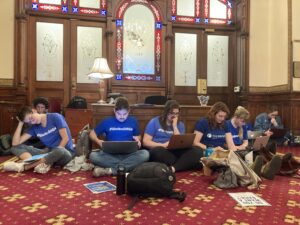Students have rallied behind dining hall workers as they negotiate with Aramark, the company Georgetown contracts for dining services, for a new contract. Dining hall workers are demanding higher pay and improved benefits, and the first negotiation session was held on March 6.
Aramark has a history of allegations regarding poor labor practices. In 2015, the Voice found that Georgetown dining workers had a lower wage than dining workers employed by Aramark at nearby universities in the area, including American University and George Washington University.
Aramark representatives did not respond to multiple requests for comment, in person or by email.
Georgetown’s dining hall staff, including workers at the Leo J. O’Donovan Dining Hall (Leo’s), Epicurean & Company, the Leavey Center, and Einstein Bros. Bagels, are employed by Aramark and represented by the same labor union, UNITE HERE Local 23. The union currently represents nearly 25,000 workers, across multiple cities, who work in the service sector.
The contract between Georgetown’s unionized dining hall workers and Aramark expired at the end of 2023. Although the workers’ pay and benefits remain constant, the contract’s expiration prevents workers from receiving pay increases until they agree on a new contract. During this period, the clause that bans workers from striking is suspended and employers are prevented from withholding work as a bargaining chip in union negotiations.
Negotiations are ongoing and will probably require multiple sessions in order for an agreement to be reached. As they enter another session, students and UNITE HERE Local 23 want to ensure that Aramark bargains in good faith with workers.
The Georgetown Coalition for Workers’ Rights (GCWR), a student group, released a solidarity statement on Feb. 9 in support of workers. The statement aims to demonstrate the solidarity between the Georgetown community and the dining hall staff, given what GCWR describes as the continued mistreatment of workers.
“The biggest demands are going to be, one, for higher wages, people need to be paid more. Two, better health insurance or cheaper health insurance,” Josh Gavsie (CAS ’24), director of GCWR, said, adding that increased sick leave is another key demand.
GCWR actively meets with dining workers in meetings every other week throughout the semester, but will not be present for union negotiations. During these meetings, workers provide the members with updates about their experiences in their work environment.
According to GCWR and workers who spoke with the Voice, it has been challenging for workers to receive a schedule that allows them to work a full 40-hour work week within normal hours, something they hope a new contract will address. In order to reach a 40-hour work week, which due to inflation workers feel is necessary to provide for themselves and their families, many workers have to work night or weekend shifts under the current scheduling system.
“When you start work, you start working at the bottom. That means you work nights, you work weekends,” Catherine Anderson, a Leo’s dining worker, said. “I started out working at nighttime. I started out working every weekend. [Now,] to get 40 hours, you have to go back to nights, you have to go back to weekends. We don’t really think that’s fair. So that’s one of the things that we want to fight very hard against.”
Many workers are unable to work at nighttime because they would have to find childcare or depend on public transportation to take them to and from work, according to Anderson.
According to Maya Garg (CAS ’26), a member of GCWR Facilities and Dining Committees, the high volume of temporary workers employed by Aramark has prevented full-time employees from working the number of hours they would like.
Interviewed workers said that most employees are only scheduled to work 30-37 hours a week, despite their desire to work a full 40 hours.
Dining workers are also attempting to change the current late policy for their new contract. Currently, Aramark gives a six-minute grace period; when an employee comes in after that period, they are marked as late in the system. In order for an employee to receive holiday pay, they must be present and on time the day before and the day after the holiday.
This late policy has penalized workers in the past, Anderson said, resulting in them missing out on significant amounts of holiday pay. For example, during COVID, Aramark paid holidays for Thanksgiving, Christmas, New Year’s Day, and Martin Luther King Jr. Day in one payment, and according to Anderson, one employee didn’t receive any holiday pay for those four days because she was three minutes late on a single day.
Daily and weekly job assignments for employees also lack consistency. Aramark regularly rotates workers between dining locations in a specific building, or between completely separate buildings.
“During those 38-39 hours that a worker might be in Leo’s or something like that, they are being asked to do six different jobs that might have different pay scales,” Matt Dame (CAS ’27), a member of GCWR’s Facilities, Dining, and Events Committees, said.
Interviewed workers confirmed that employees have to work several different jobs in a week due to understaffing issues, meaning they are sometimes assigned to positions they have no experience working, leading to a stressful work experience.
Beyond having to perform various roles in one shift or work week, GCWR members said that dining workers are required to work in unsafe and unhealthy working conditions. These conditions also place the student body and other members of the Georgetown community who receive food from these locations at risk. GCWR members hope that the solidarity statement will help pressure Aramark into improving health and sanitation standards for dining workers.
“In Leo’s, they have their break room, where they eat all their meals, very close to a dumpster outside, and so there are mice and rats that come into where they’re eating, and it’s supposed to be a clean space,” Garg said. “Or in Starbucks, they have cold water in the back room where you’re supposed to be washing dishes and things, and you need hot water for that. They’re washing things constantly in cold water, which is both unsafe for them and unsanitary.”
Additionally, workers claim that Aramark’s management has treated them poorly, an issue that they plan on addressing during negotiations. A cook at Leo’s, who spoke with the Voice under the condition of anonymity for fear of retribution, said that managers often curse workers out, show favoritism towards some workers, and don’t supply the workers with the necessary ingredients for a menu, expecting them to improvise. She also mentioned that she and other workers have had little success escalating their concerns about mistreatment.
“People have been mistreated, and stuff like that. It’s a lot of disrespect on the job and that’s something that we’re going to fight hard to take care of,” the cook at Leo’s said. “Even if we have to go to the human resources office, and they’re gonna have to get involved. We come to work hard every day, and we don’t deserve to get disrespected.”
GCWR members also acknowledged the role students and other community members play in treating workers badly. While this issue isn’t the primary focus in the negotiations, GCWR representatives believe it’s an important issue worth addressing and see this as an appropriate time to begin the conversation amongst the student body.
“Most people overlook the contributions made by facilities staff, whether it be housekeeping and maintenance [or] keeping the gardens running. They overlook the contributions of the dining staff [who ensure] that people are fed for multiple meals every day. And that’s unacceptable,” Gavsie said.
Members of GCWR are hopeful that the university will also show its support for workers’ demands. The solidarity statement received 492 signatures from students, 42 signatures from faculty, and support from 11 student organizations. Students delivered the statement to Aramark’s management in Leo’s on Feb. 29.
Although the university does not directly employ dining hall workers, Aramark is contracted by Georgetown, and students believe the university has some leverage over how Aramark behaves during negotiations. In 2020, the Voice found that Georgetown provides Aramark with $26,134,459 annually for dining hall services.
“[Georgetown has] the ability to dictate what Aramark ultimately does, and especially in this bargaining process, even though it is between Aramark and the union,” Fiona Naughton (SFS ’26), member of the GCWR Steering Committee, said. “Georgetown has the ability and the power and the prerogative to say to Aramark, ‘You have to respect these rights, and you have to bargain in good faith,’ to ensure that this new contract will be even better for workers than the previous contracts.”
“Georgetown University is committed to ensuring workers are treated fairly under our Just Employment Policy and works with contractors like Aramark on campus to ensure compliance with the policy, which requires contractors to provide a greater total compensation package than called for by existing metro-area wage ordinances,” a university spokesperson wrote in an email to the Voice.
GCWR members also hope the university will support dining workers based on its policies, past stances, and values.
“We’re emphasizing Jesuit values, or the stances that Georgetown has taken in the past that have been pro-labor and pro-workers rights,” Dame said.
The statement’s writers stressed the need to show the university that students stand with dining hall workers and will not allow their continued mistreatment.
“It puts you in a lot better position to fight with a lot of people behind you than it is with few, and to show that the entire university body is behind our dining workers as they fight for another contract, it’s really the least you can do as students,” Xavi Molina (CAS ’25), member of the GCWR Facilities Committee, said.
For many members of GCWR, this fight is personal. They have formed connections with the dining workers who serve the Georgetown community and want to ensure that they are treated fairly.
“Generally, this campus makes it very easy to invisibilize the workers around us, and there is this assumption that we are a homogenous student body who does not have anything in common with these folks,” Molina said. “That has been upsetting to me since I’ve come here because I think, since my first day as a freshman at this dorm, the folks who were cleaning my hallways felt more familiar to me than the people who were sleeping next door.”
Workers expressed appreciation that students have organized to support them.
“It’s so nice to know that the students are giving us support because their voice matters to us a lot. That’s why we come in every day: because of the students,” the cook at Leo’s said.
Workers also acknowledged the support from faculty members when they come to the dining halls and talk to workers.
“They took the time to come and listen to what we had to say. They offered a lot of words of encouragement. They spoke up for us and they let management know that this is a campus where everyone should be treated fairly,” Anderson said.
Organizers hope that the Georgetown community will recognize the many sacrifices dining workers make for students, and that this will mobilize community members to show support.
“It’s our responsibility to be there for them in the same way that they are for us every single day,” Naughton said. “They wake up early, they go to sleep late just to ensure that we are fed, that we are taken care of. And I think it’s shameful if we don’t show up for them in the exact same way that they show up for us.”








Can I get the address from local 23